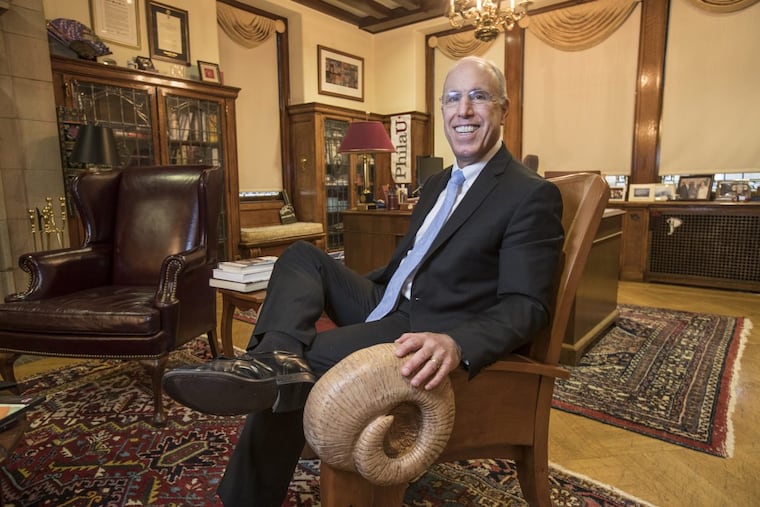Stephen Spinelli: Managing up is part of the executive's job
As a top executive, Stephen Spinelli Jr., 62, finds himself in an unusual position. He's gone from number one to number two, yet has more responsibility.

As a top executive, Stephen Spinelli Jr., 62, finds himself in an unusual position: He's gone from Number One to Number Two, yet has more responsibility.
Until the change became official July 1, Spinelli's title was president of Philadelphia University, in charge of the small, lovely East Falls campus with a reputation in the world of design, and of adding students, improving revenues, and growing operating margins.
Now, his title is chancellor of Thomas Jefferson University, with which Philadelphia University has merged, all of it part of a larger system that includes Jefferson Health and its hospitals. His boss is Stephen Klasko, the chief executive overseeing the entire operation.
The merger was announced two years ago, as some area colleges were struggling financially and facing declining numbers of high school graduates in Pennsylvania and New Jersey.
You co-founded Jiffy Lube International Inc. and served as chairman and chief executive of American Oil Change Corp. for 10 years. Since 2007, you’ve been president at Philadelphia University. You’re used to being the boss, right?
That's a fallacy. As an executive, you have so many bosses, and if you don't know how to deal up, down and across, you're going to fail. I've had three board chairs here, who were more or less aggressive. If I don't learn how to manage up to that board chair, I'm going to fail. And remember, any tenured faculty can get together, have a vote of no confidence, and kick the president out. If you can fire me, you're my boss.
Good point.
I feel like I have a lot of bosses. Talk to Mr. [Maurice] Kanbar, who gave us $30 million. Do you think I'm giving him orders?
How do you get along with Dr. Klasko?
Terrifically. He has the biggest ego, with the most assertive nature that is self-aware that I've ever met.
What does that mean?
He wants to change the world, and he thinks he can. When he bumps into a problem where he doesn't understand, or he doesn't believe he's qualified to make an answer, he says, `I don't understand. I need your help.' When we have a debate, sometimes heated, he listens carefully, and many times, 49 percent of the time, he says, `I think you have a better answer.'
You’ve talked about how your engineering students in material design are working with medical students in perfecting certain kinds of bandages. That’s academic synergy. Any savings on the operational side?
There's a regulatory impact that is overwhelming. The cost per student for regulatory compliance has tripled — reporting costs, the process by which we admit students. The nature of our application. It encompasses everything. It's so overwhelming and confusing. The economy of scale is important.
What did Jefferson have that Philadelphia University needed?
Part of their sophistication is they have robust systems. We're taking this action because we think it's the appropriate way to deliver better education and thrive in this environment. A lot of small schools will not. Think about the demographics: For the first time, since World War II, we have a leveling off of people going into colleges. We have online learning. So the delivery systems have exploded, which is causing infrastructure chaos, where you've got to keep up. If you don't have an electronic infrastructure, it's not lowering costs. It's raising costs.
With your business background, and with this merger with Jefferson, you’ve been negotiating your whole life. What would you tell a young person coming out of school about negotiating that first salary?
I would tell them not to, especially coming out of school. Look for the place where you can create the most value and where you'll get the best experience. Think long term. If you're thinking about how I can make an extra 500 bucks, you're starting in the wrong place. I'm practical, too. You've got to pay bills. I want you to eat, and I don't want you sleeping in your car. But anything above that.
So what do you negotiate?
Negotiate over responsibilities. How will I be measured? Who will I be working with? What is the ambition of this organization? Can I help shape it? Are they listening to you when you talk about your ambitions? Think about how you'll create value. You do all that, and you'll grow like crazy and they'll want to pay you more, or else someone else will want to pay you more.
STEPHEN SPINELLI JR.
Home: East Falls.
Family: Carol Fulton Spinelli, wife; Kate, 35; Stephen 3d, 32.
Diplomas: McDaniel College, economics; Babson College, master's in business; Imperial College, Ph.D., economics.
Resume: Co-founder, Jiffy Lube International; CEO, American Oil Change Corp; academic career at Babson College.
Favorite drink: Bourbon, chosen according to mood. To celebrate, Basil Hayden. For fun, Maker's Mark. For illumination, Jefferson's. For birthdays, Blanton's.
THOMAS JEFFERSON UNIVERSITY.
What: Combination of Thomas Jefferson University and Philadelphia University, merged July 2017.
Academics: Nine colleges, four schools, and 160 graduate and undergraduate programs. Includes the Sidney Kimmel Medical College. 6,000 faculty members; 7,800 students.
Highest ranking executive: Stephen K. Klasko, president and chief executive, Thomas Jefferson University and Jefferson Health.
Employees: 6,181 (faculty/staff)
Annual revenue: $508.4 million (fiscal 2018)